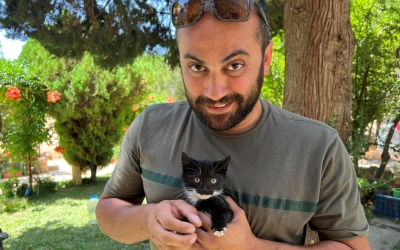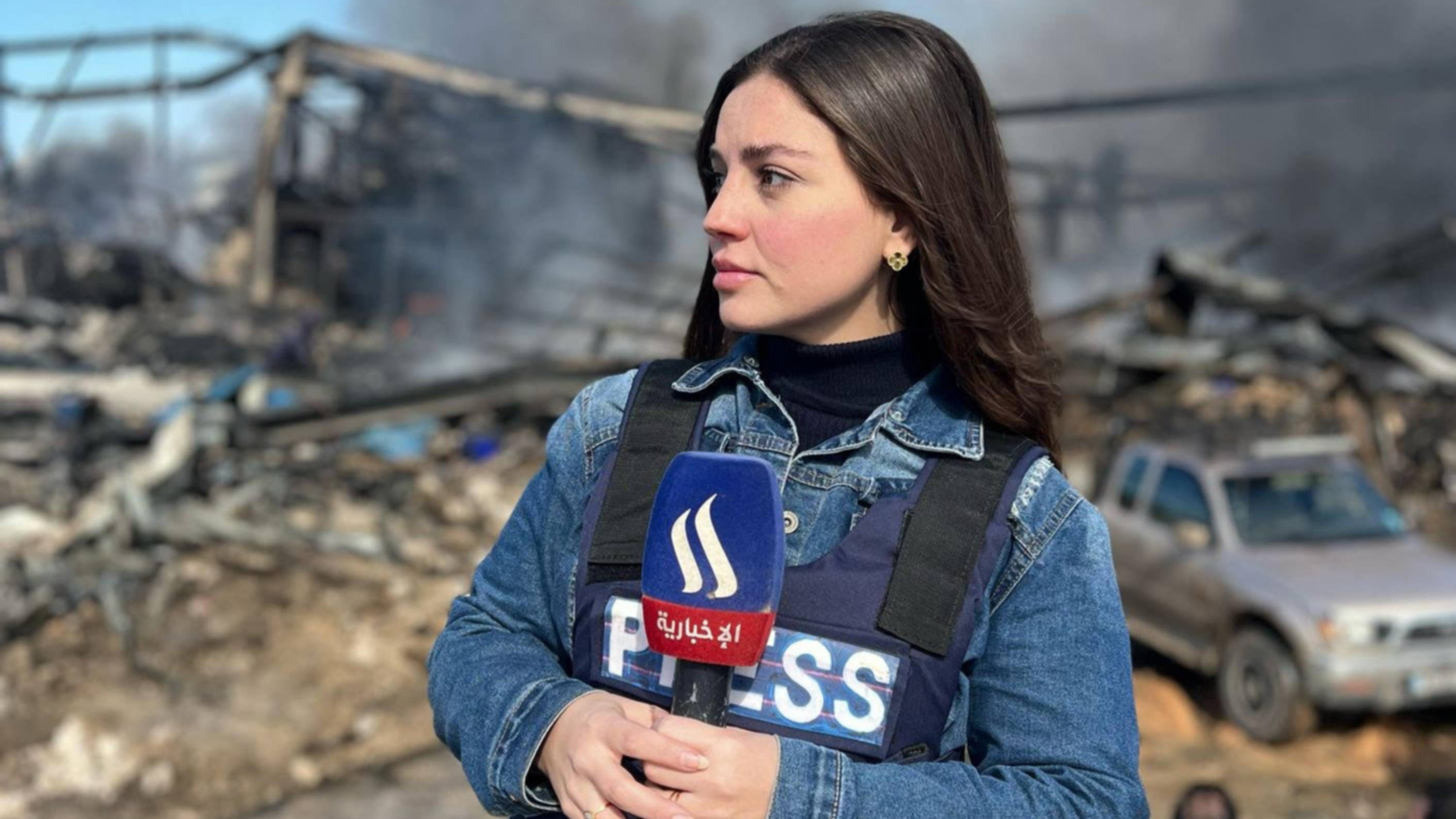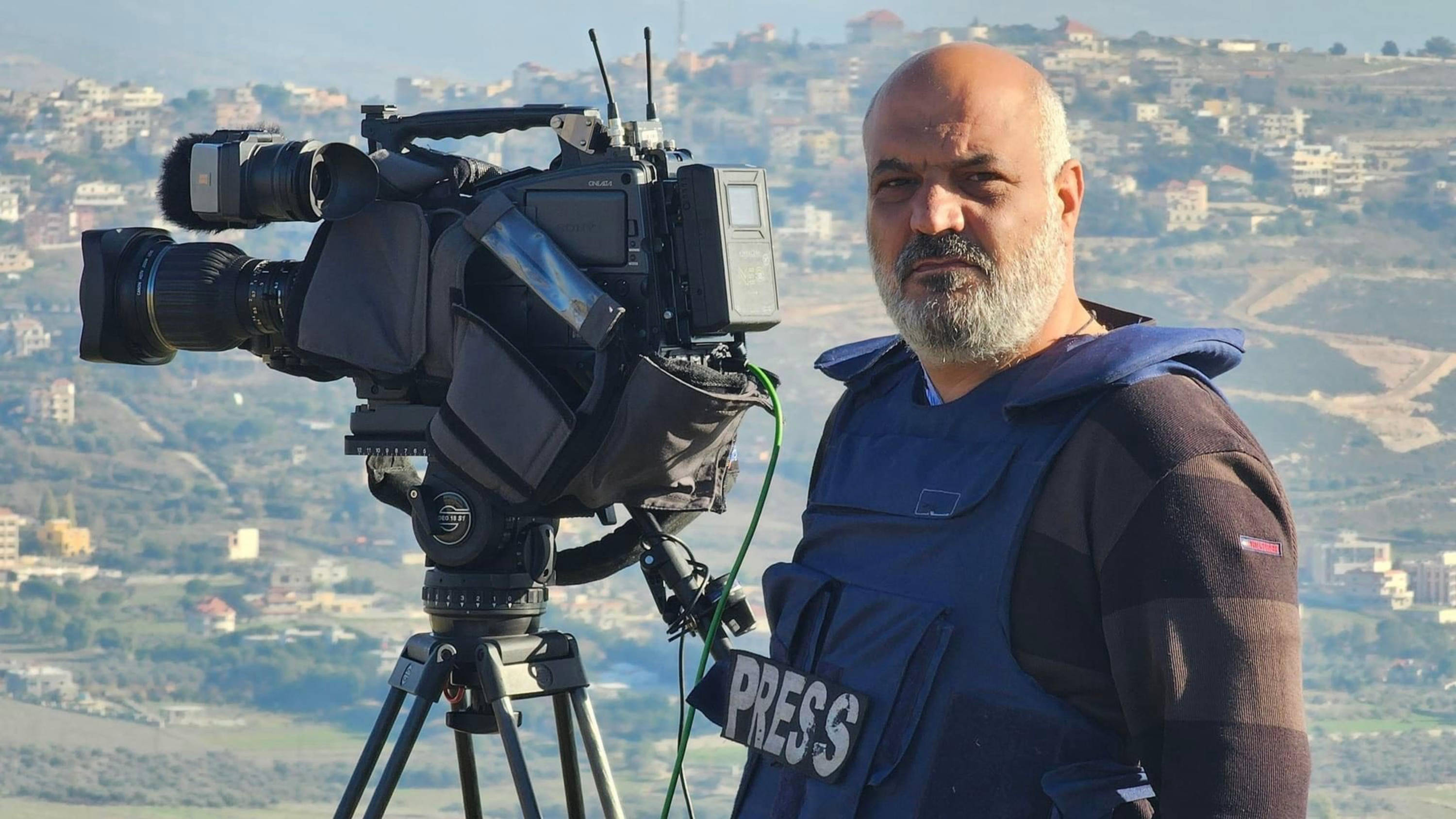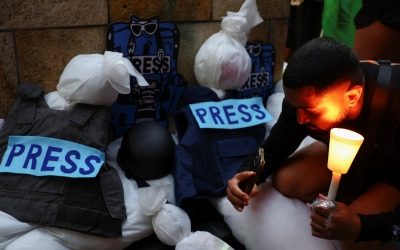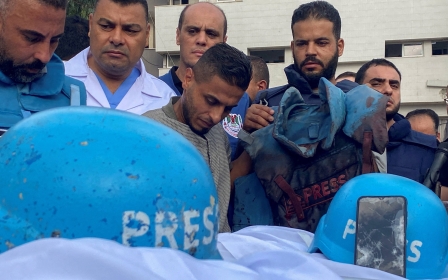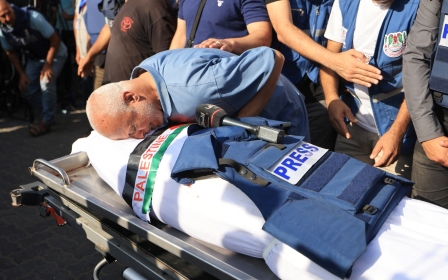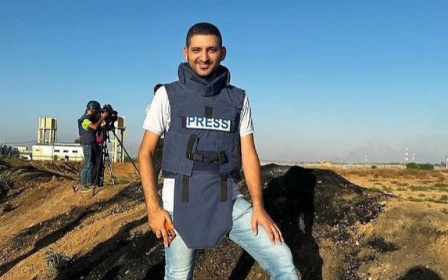On the frontline of war, Lebanon's journalists fear being Israel’s next victim
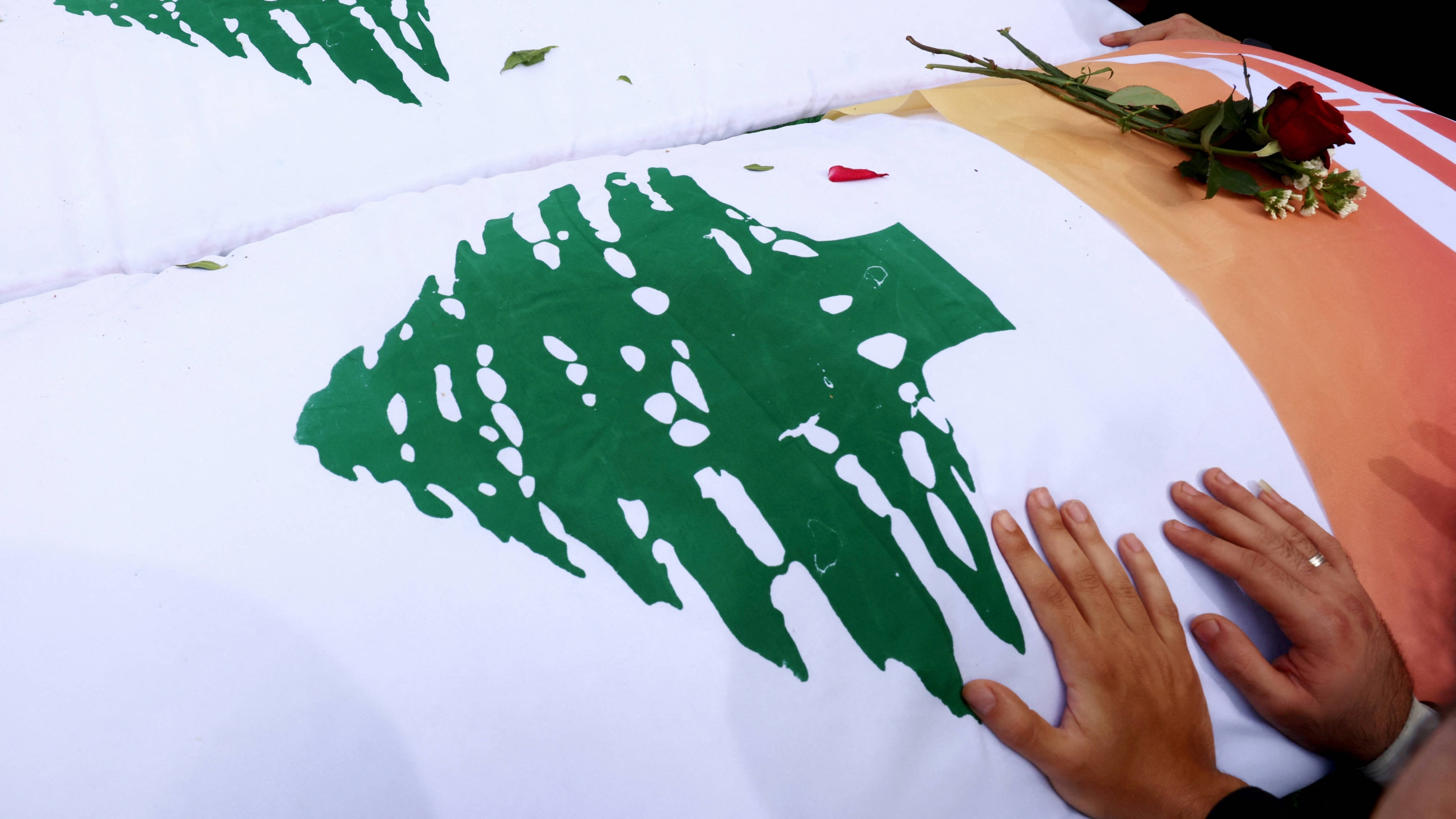
In December, Ibrahim Dawi was driving with a group of other journalists on an empty road between the coastal town of Naqoura and Tayri in south Lebanon when they narrowly survived an Israeli attack.
“Israel is specifically targeting journalists to curb the truth. I will need to be more vigilant, but I have no intention to scale back on my reporting,” said Dawi, a 21-year-old reporter for the independent broadcaster Radio Sawt El Shaab.
The incident recalls several others where journalists have been involved in life-threatening experiences when Israel struck areas where they had been reporting on the growing border tension between Israel and Hezbollah.
In total, Israeli attacks have so far claimed the lives of three Lebanese journalists.
On 13 October, an Israeli attack on the border town of Alma al-Chaab struck a group of journalists, including Dawi, killing Reuters journalist Issam Abdallah and wounding six others.
New MEE newsletter: Jerusalem Dispatch
Sign up to get the latest insights and analysis on Israel-Palestine, alongside Turkey Unpacked and other MEE newsletters
“I was near Abdallah when he was killed. The image of his body and dismembered leg being handed to the Civil Defence has since been imprinted on me,” the journalist recalled.
Israel has repeatedly targeted journalists in Gaza and Lebanon since 7 October, killing at least 90 journalists in Gaza, according to the latest data released by the Committee to Protect Journalists (CPJ).
For the journalists covering the conflict in south Lebanon, the fear of being the next target has grown as Israel now strikes areas that were previously thought to be relatively safe.
Meanwhile, many reporters say they are sent into the field with no appropriate safety guidance and no hostile environment training.
'Full-fledged danger'
The attack on the journalists in Alma al-Chaab was described by Amnesty International and Human Rights Watch as a war crime.
But while the attack led to widespread condemnations and calls for a transparent investigation by the Israeli military, a month later, an Israeli strike killed two more journalists in south Lebanon, Farah Omar and Rabih Maamari, who were on assignment for the pro-Iran channel Al Mayadeen.
A United Nations inquiry determined in a report released on Wednesday that the shelling that killed Abdallah - an attack that hit a group of "clearly identifiable journalists" - was in breach of international law.
Despite witnessing Abdallah’s brutal death, Dawi, a journalist from the town of Zawtar in the Nabatieh province, says he is determined to carry on reporting and documenting all the Israeli violations, even as Israeli fire grows closer.
“Towns on the borders were relatively safe at the beginning of the war, as the attacks were not close to residential areas… but now that the conflict in the south has expanded, the situation has deteriorated into full-fledged danger as homes are being bombed,” he told Middle East Eye.
On 14 February, an Israeli air strike killed seven civilians from the same family when it hit a residential building in Nabatieh, a city that lies 50 km away from the border with Israel and hosts around 18 percent of the 90,000 people who have fled their homes since the escalation of cross-border tension in October.
The same Israeli attack on the Nabatieh residential building reportedly killed a Hezbollah commander and two fighters.
‘Torn between duty and life’
At the beginning of the war, Sally Korfaly, 29, a reporter for Al-Iraqiya Broadcasting Television Network, found herself thrust into conflict reporting without any prior experience covering hostile environments.
Her impromptu transition from writing on politics and social topics to reporting from a conflict zone meant she was left to work out what safety precautions to take by herself, risking her safety and life in the process.
As the security situation worsened, Korfaly decided to scale back on reporting and avoid areas of exceptional violence. But it was not an easy decision.
“I was torn between choosing my safety, and my duty as a journalist to report on the war,” Korfaly said. “I decided not to report every day and dodge highly dangerous zones.”
She said she was lucky to have her organisation’s backing and was eventually offered safety training to enable her to be better prepared for the dangers of reporting in a conflict zone. But despite this, she says she does not feel any safer.
“Even during times of peace, laws failed to protect us as journalists performing our jobs. The situation only worsened with the war,” the journalist said.
Korfali added that laws intended to protect journalists are frequently disregarded in Lebanon, and reporters are often harassed if they tackle a politically sensitive subject.
But while Korfali can rely on her organisation for some support at least, independent journalists are facing insurmountable challenges entirely on their own.
'I have decided to steer clear of dangerous areas because we are offered no safety kits'
- Sally Korfali
Mohamed al-Zanaty, 35, an independent journalist working for multiple regional and international media outlets says that the lack of guarantees, including social and health insurance, adds an additional layer of uncertainty to his work.
“Working for international media outlets is more financially rewarding, however, I have decided to steer clear of dangerous areas because we are offered no safety kits and it is always a challenge to obtain permits as a freelance journalist,” he said.
He added that the risk is made worse by the impunity that he says Israel enjoys.
“We are reporting on the conflict with [Israel] that has shown no respect to international laws and no intention to avoid targeting journalists,” Zanaty said.
Veterans step in
Al Jazeera journalist Ayman al-Mawla has been covering wars and conflicts for 34 years, including the 2000 withdrawal of Israel from southern Lebanon, and the US-led wars in Iraq and Afghanistan.
“There are journalists who lack experience of covering conflicts, and I have become their contact point to offer safety advice, as well as psychological and mental support,” Mawla said.
Mawla and another Al Jazeera reporter, Ehab Al Aqdi, have started an initiative to support their less experienced colleagues in southern Lebanon as they cover the conflict.
Their WhatsApp group, which they created in the earlier days of the war and named "We will cross over”, now includes 62 Lebanese and foreign journalists.
The group offers guidance on how to safely reach reporting areas and has set up and shared the location of eight meeting points, all pinned on Google Maps, where journalists in southern Lebanon can gather, helping to create a sense of comradery, both on and off the field.
'To this day, journalists in the Arab world still lose their lives to conflicts and they are completely disregarded'
- Ayman al-Mawla, journalist
“This [WhatsApp] group has become a safe refuge for journalists, they not only share professional news but they have also bonded together, leaving them feeling safer amid the ongoing conflict,” Mawla said.
But despite his experience - and taking extra precautions - Mawla only just survived a recent Israeli strike on one of the meeting points he helped set up, where he said everyone was visibly identified as journalists.
Although shocking, the attack came as no surprise. “International laws fail to protect journalists. To this day, journalists in the Arab world still lose their lives to conflicts and they are completely disregarded,” Mawla said.
‘Safety is indisputable’
Because of the lack of proper hostile environment training for journalists with assignments in southern Lebanon, several organisations have stepped in to offer support, including the Samir Kassir Foundation.
Widad Jarbouh, a researcher at Samir Kassir Foundation, told MEE that the foundation provides training for an average of 35 journalists from across the region every year.
The training, which was first offered six years ago, includes workshops that teach journalists to better navigate dangerous situations, as well as offering psychological support to those who have had horrendous experiences while covering wars and conflicts.
“In theory, journalists are civilians protected by all international humanitarian laws, but this is a fact that is repeatedly disregarded by Israel,” Jarbouh said.
In another workshop organised by the International Lebanese Press website in collaboration with the Lebanese Civil Defence, journalists interested in covering conflicts are trained to become war correspondents.
The workshops, which began running in May last year, have so far trained 32 journalists on how to deal with phosphorus attacks, how to protect themselves if a building collapses, and how to perform basic first aid.
Organiser Khaled Ayyad said that all journalists should be properly trained before they attempt conflict reporting.
“The safety of journalists should be indisputable,” he said.
This story was published in collaboration with Egab.
Middle East Eye delivers independent and unrivalled coverage and analysis of the Middle East, North Africa and beyond. To learn more about republishing this content and the associated fees, please fill out this form. More about MEE can be found here.


